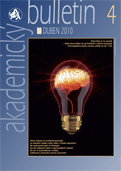Prestigious European grant for a young scientist from the Institute of Molecular Genetics of The CAS
The biologist doc. Mgr. Petr Svoboda, Ph.D., from the Institute of Molecular Genetics of The CAS acquires a significant grant from the European Research Council – the ERC Consolidator Grant. His project entitled D-FENS was selected from more than 2,500 proposals. The scientific work of Svoboda’s laboratory will hence be supported by EUR two million for the next five years. ERC Consolidator Grants are intended for young scientists, who obtained their doctorate between seven and twelve years before submission of their proposal, have distinctly above-average scientific results considering the given field and their career stage and prepare a high quality project with an original idea.
The D-FENS project will investigate the defensive function of so-called small RNA. Small RNA are
molecules, which in animals generally maintain the stability of the genome in embryonic cells and
in invertebrates provide antiviral immunity through the mechanism of RNA interference (the Nobel
Prize was awarded in 2006 for its discovery). In mammals, the antiviral RNA interference is turned
off and instead of it a system operates of innate and acquired immunities using specialized cells.
The main aim of the project is to test how a re-enabling of RNA interference changes mammalian
virus protection. “We want to see if this could be a way to a new kind of antiviral therapy,” says
Petr Svoboda. The remaining parts of the project are dedicated to the biological role of small RNAs
in mammalian eggs, which represent a model for studying the evolutionary adaptation of small RNA. “
The study of evolutionary adaptation often reveal things that would otherwise be difficult to learn
about molecular mechanisms,” he adds.
Petr Svoboda graduated in cellular and developmental biology at the Faculty of Science of
Charles University. In 1998, he left for the University of Pennsylvania in Philadelphia (an Ivy
League school), where in 2002 he received his doctorate in cellular and molecular biology. He then
spent three years in a post-doctoral residence at the Friedrich Miescher Institute in Basel,
Switzerland. With his acquired experience, he returned to Prague where he founded his own
scientific group in 2007 at the Institute of Molecular Genetics of The CAS. He regularly publishes
in prestigious scientific journals and is the laureate of several awards, including the prestigious
EMBO Start Up grant (2006), the Fellowship of J. E. Purkyně from The Czech Academy of Sciences
(2006) and the Neuron Award for Young Scientists (2014).
The original date of the announcement of the results of the prestigious competition was
postponed by several days, but the last days of unending waiting and increasing nervousness were
eventually rewarded with a positive result. Receiving this grant is an enormous success and proof
that even in the Czech Republic it is possible to conduct science on a global level.
5 Mar 2015







